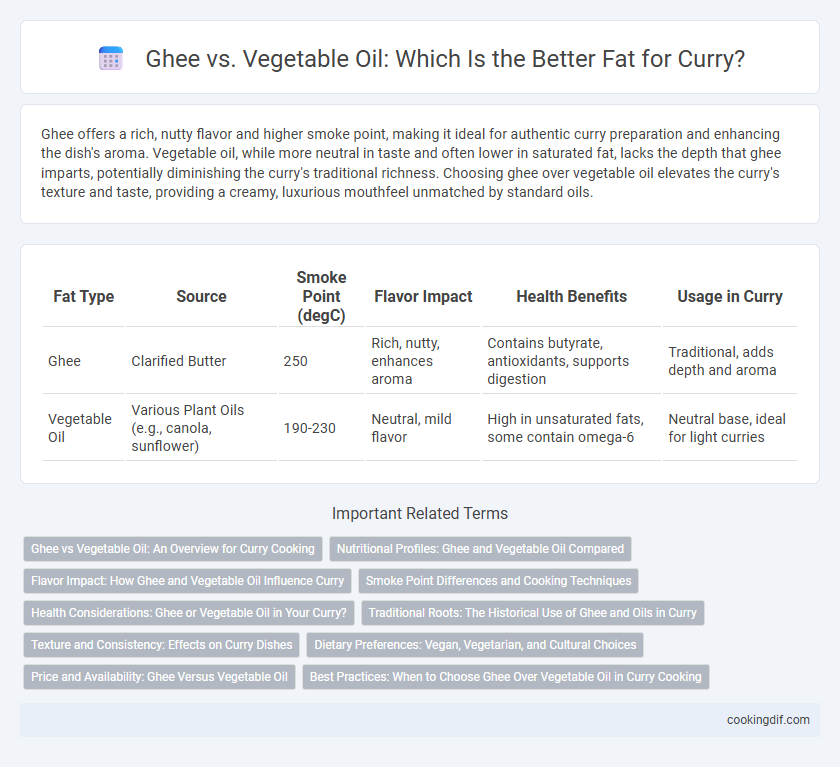Ghee offers a rich, nutty flavor and higher smoke point, making it ideal for authentic curry preparation and enhancing the dish's aroma. Vegetable oil, while more neutral in taste and often lower in saturated fat, lacks the depth that ghee imparts, potentially diminishing the curry's traditional richness. Choosing ghee over vegetable oil elevates the curry's texture and taste, providing a creamy, luxurious mouthfeel unmatched by standard oils.
Table of Comparison
| Fat Type | Source | Smoke Point (degC) | Flavor Impact | Health Benefits | Usage in Curry |
|---|---|---|---|---|---|
| Ghee | Clarified Butter | 250 | Rich, nutty, enhances aroma | Contains butyrate, antioxidants, supports digestion | Traditional, adds depth and aroma |
| Vegetable Oil | Various Plant Oils (e.g., canola, sunflower) | 190-230 | Neutral, mild flavor | High in unsaturated fats, some contain omega-6 | Neutral base, ideal for light curries |
Ghee vs Vegetable Oil: An Overview for Curry Cooking
Ghee offers a rich, nutty flavor and high smoke point, making it ideal for authentic curry cooking that requires intense heat without burning. Vegetable oil, while more neutral and often lower in saturated fats, lacks the distinctive taste and aroma ghee imparts to traditional Indian dishes. Choosing ghee enhances the depth and complexity of curry flavors, aligning with traditional culinary practices and providing beneficial short-chain fatty acids.
Nutritional Profiles: Ghee and Vegetable Oil Compared
Ghee contains higher concentrations of saturated fats and fat-soluble vitamins like A, D, E, and K, supporting nutrient absorption and cellular health. Vegetable oils, such as canola or sunflower, offer more polyunsaturated fats, including omega-6 fatty acids, which promote heart health but require balanced intake to prevent inflammation. The differing smoke points also influence cooking choices, with ghee's higher smoke point making it suitable for high-heat curry preparations.
Flavor Impact: How Ghee and Vegetable Oil Influence Curry
Ghee imparts a rich, nutty flavor that deepens the complexity of curry, enhancing traditional Indian spices and aromas. Vegetable oil tends to have a neutral taste, allowing the curry's spices to stand out without adding extra flavor layers. Using ghee not only influences the fat content but also significantly elevates the sensory experience of curry dishes.
Smoke Point Differences and Cooking Techniques
Ghee boasts a high smoke point of approximately 485degF (252degC), making it ideal for high-heat cooking techniques like sauteing and frying in curry preparation. Vegetable oils vary widely; refined oils like canola or sunflower have smoke points between 400degF to 450degF, while unrefined oils smoke at lower temperatures, risking burnt flavors. Choosing ghee enhances flavor complexity and maintains stability under intense heat, whereas selecting the appropriate vegetable oil depends on the cooking method and desired taste profile.
Health Considerations: Ghee or Vegetable Oil in Your Curry?
Ghee is rich in saturated fats and contains fat-soluble vitamins like A, D, E, and K, which support immune function and skin health, while vegetable oils often provide higher amounts of polyunsaturated fats beneficial for heart health. The high smoke point of ghee makes it suitable for high-temperature cooking, preserving flavor without producing harmful free radicals, whereas some vegetable oils may oxidize and generate unhealthy compounds if overheated. Choosing between ghee and vegetable oil depends on specific dietary needs, such as managing cholesterol levels or balancing omega-6 to omega-3 fatty acid intake for optimal cardiovascular benefits in your curry.
Traditional Roots: The Historical Use of Ghee and Oils in Curry
Ghee has historically been the preferred fat in traditional Indian curry recipes due to its rich, nutty flavor and high smoke point, which enhances the dish's authentic taste and aroma. Vegetable oils, while more modern and widely used today for their affordability and neutral flavor, lack the deep cultural and culinary significance that ghee holds in classic curry preparation. The use of ghee in curries reflects centuries-old cooking traditions that emphasize its health benefits and flavor complexities integral to regional Indian cuisines.
Texture and Consistency: Effects on Curry Dishes
Ghee imparts a rich, creamy texture and enhances the consistency of curry dishes by providing a smooth, velvety mouthfeel due to its clarified butter fat content. Vegetable oil tends to produce a lighter texture and thinner consistency, which can result in a less cohesive sauce and reduced depth of flavor. Choosing ghee over vegetable oil helps achieve a more luxurious and well-rounded curry consistency, crucial for traditional recipes.
Dietary Preferences: Vegan, Vegetarian, and Cultural Choices
Ghee, a clarified butter, is widely used in Indian cooking but is unsuitable for vegans due to its animal origin, whereas vegetable oil aligns with vegan and vegetarian dietary preferences. Cultural choices also influence the selection; ghee is traditional in many South Asian cuisines, valued for its rich flavor and aroma, while vegetable oils like sunflower or mustard oil are preferred for their neutral taste and cooking versatility. Understanding these dietary and cultural factors helps in choosing the appropriate fat for curry preparation.
Price and Availability: Ghee Versus Vegetable Oil
Ghee typically costs more than vegetable oil due to its elaborate production process and premium quality, making it a less affordable option for everyday cooking. Vegetable oil is widely available in supermarkets and grocery stores worldwide at a lower price point, offering a convenient and budget-friendly fat source. While ghee offers a rich flavor and higher smoke point, vegetable oil stands out for its economical value and easy accessibility.
Best Practices: When to Choose Ghee Over Vegetable Oil in Curry Cooking
Ghee offers a higher smoke point and rich, nutty flavor ideal for sauteing spices and achieving authentic curry aromas, while its composition of healthy short- and medium-chain fatty acids supports better digestion. Vegetable oils like canola or sunflower oil contain more polyunsaturated fats, which can oxidize at high heat, potentially altering the flavor and nutritional profile of the curry. Choose ghee over vegetable oil for cooking curry when aiming for enhanced flavor depth, improved heat stability, and traditional culinary authenticity.
Ghee vs vegetable oil for fat Infographic

 cookingdif.com
cookingdif.com